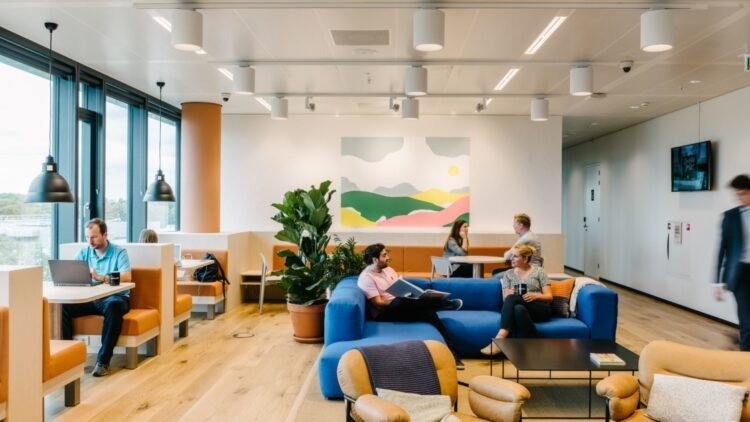Corporate Social Responsibility (CSR) means that a corporation should be held accountable for any of its actions that affect people, their communities and their environment; it may require a company to forgo some profits if its social impacts are seriously harmful to the corporation’s stakeholders or if its funds can be used to promote a positive social good. Tougher competition recently has compelled the firms to adopt something that is different from their rivals and has also put a pressure on the firms to examine their philanthropy and other social activities, by doing so the company can sometimes achieve a strategic advantage over its competitors. There is a business case for CSR but it is much less important or influential than many proponents of civil regulation believe, CSR is best understood as a niche rather than a generic strategy: it makes business sense for some firms in some areas in Continue reading
Modern Management Concepts
What Is Coworking?
One of the grimmest predictions about the future was described by Robert Putnam in his work on social capital. He envisaged low likelihood of participation in community life, smaller groups of friends, even less happiness, and lower perceived quality of life. Furthermore, the enthusiasts of globalization and internet predicted that since people do not have to be together in order to work together, so simply they will not be. Both of these statements are deemed fallacious when recent innovative developments like coworking spaces are considered. Instead of dividing people and further rupturing community life, they reintroduce collaboration and community building through establishing an innovative office design that is being implemented worldwide. Coworking has been present for centuries, but the first forms of collaboration appeared in the beginning of the 20th century. Artists from around the world gathered in Paris to live and work. One of the establishments, La Ruche, was Continue reading
Regeneration of Offices and Modern Approaches to Working
Design of a contemporary workspace has a responsibility to comply with current respect of social change, work flexibility, evolving technology, sustainability and a diverse workplace. Current offices are in need of constant innovative solutions that will sustain the modern way of development in co- working places. Contemporary offices are in need of stable development and adjustments to existing social principles. Present day work environment has significantly changed throughout the decade. Co-working office spaces are now in need of a relaxed atmosphere. Studies show that contemporary culture in the way people work allow them to prosper better within the business markets. Twenty-first century office design comprises in merging single user and collaborative needs to give the best possible opportunities. From large scale offices to live/work projects and small-scale refurbishments, the type of social needs imposes a movement of the idea how every office can be improved. Within the corporation’s framework employers Continue reading
The Jugaad Approach to Innovation
The term ‘jugaad’ signifies the importance of implying the innovation process in the workplaces. This helps the organizations to be innovative in their working zones and inspires them to bring in the changes that will be elemental for their success. The concept of ‘jugaad’ is a very important one in the Indian managerial practices. This certainly means the approaches to innovation. This is a Hindi word and this reflects how the innovation practices could lead to the success of the organizations. In India, the workplaces are totally constrained with the diverse workforces. The harsh problematic situations should be overcome by the innovative approaches within the organization and effective solutions should be addressed despite having very limited resources. There have been all kinds of lacks in India regarding the resources, proper workforce, training of the employees and many other things. However, the services cannot be stopped in spite of these problems. Continue reading
A Brief Introduction to Six Sigma Methodology
The creation of Six Sigma Methodology is understood to be traced back to Carl Friedrich Gauss and introduced as a measurement in variation in organizations. Six Sigma name comes from the Greek alphabet “Sigma” which mathematician or statisticians uses in statistics to find a standard deviation. Motorola was the first company to use Six Sigma, to measure the quality of products and services from within. In the process of Motorola using Six Sigma, it helped them to pinpoint mistakes such as finances and operations. Six Sigma’s core philosophy was based on business process and customer requirements, extensive training to employees, focus on the organization, and creating an improved system. Six Sigma Methodology describes a business improvement approach that seeks to find and eliminate causes of defects and errors in manufacturing and service processes by focusing on outputs that are critical to customers and a clear financial return for the organization. Continue reading
Business Continuity Management (BCM) According to ISO 22301
Doing business is a great thing if everything runs perfectly. As we all know there is no such thing as a perfect way of doing anything. This is true in the business arena. Things are going to happen which is not in the best interest of the day to day operation of any business. Natural disasters such as hurricanes, tornadoes, floods, fire, and volcanoes can happen at any given time. Your business could be a victim of a serious data breach. All of the previously mentioned scenarios can seriously affect how business is run. To counteract those on foreseen events every company should have a continuity disaster recovery plan. Planning for the worst case and how the company is going to limit their downtime. The ultimate goal of the disaster recovery plan is to limit every potential risk and get the organization running as close to normal in the shortest Continue reading




